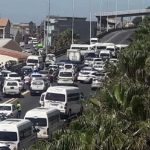Western Cape taxi drivers will start their protest again this week, disrupting traffic from major cities such as Cape Town and Bellville.
Several taxi associations have begun the resistance that could be resumed this week for their dissatisfaction with Cape Town’s Traffic Department.
They claim that the Department of Traffic officials are using the taxi drivers as a target and the first wave of protests has started in the western regions of the mother city.
The taxi drivers claim that the traffic officers focus on them and strike at them with “impossibly high fines”.
Since the beginning of October, the taxis with their vehicles have blocked the roads and streets, resulting in total chaos and traffic congestion.
The situation is so bad, motorists have been urged to avoid the N2, both inbound and outbound.
Taxi protest: Here’s what we know
The revolt, led by various taxi associations, is believed to stem from their dissatisfaction with how the city’s traffic department has targeted them.
The first wave of protests erupted in the western parts of Cape Town. Taxi drivers from Dunoon, Joe Slovo and Milnerton disrupted traffic along the N7, in the early parts of October, in reaction to a traffic operation that saw a number of the minibuses impounded for violating a number of traffic laws.
Then, on Tuesday, commuters were affected by demonstrations that were held at the Cape Town station deck.
According to mayoral committee member for safety and security, JP Smith, taxi drivers were protesting over the perceived abuse of power exhibited by traffic officers who target them on the roads, handing out ridiculous fines.
“According to reports, their dissatisfaction stems from the fact that they are fined in the first place as well as the fine amounts,” he said.
Things seemed to have cooled down over the next couple of days. However, on Friday, businesses in Cape Town have been circulating mass e-mail notices to their staff about possible disruptions to peak-hour traffic.
It is believed that taxi protestors have already interrupted traffic in some parts of the CBD, causing heavy backlogs of traffic.












